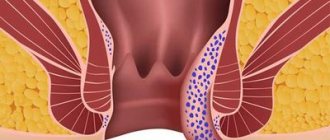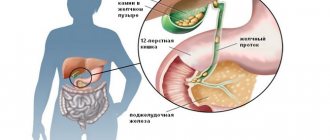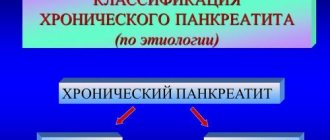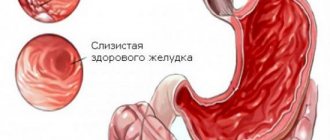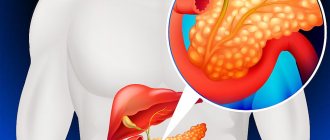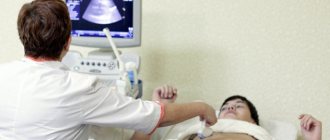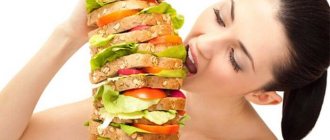Chronic pancreatitis is an inflammatory disease of the pancreas, which involves disruption of its functioning. The gland ceases to cope with digestive and regulatory functions. The disease is accompanied by periodic abdominal pain and stool disorders.
Constipation with pancreatitis is usually unusual for the acute stage. Diarrhea occurs most often, but some patients also note constipation syndrome—stool retention for three days or more. This contributes to a significant deterioration in health due to intoxication.
Constipation in the acute period is usually associated with biliary dyskinesia. Therefore, delayed bowel movement can be an alarming symptom that indicates the development of associated complications. It is important to tell your doctor about your condition and take timely measures to get rid of constipation by balancing your diet and taking laxatives.
Types of pancreatitis - acute and chronic
Acute pancreatitis may be accompanied by symptoms resembling poisoning: severe pain, fever, pale skin, vomiting, nausea. This is a dangerous disease that requires emergency care.
In chronic pancreatitis, low-grade inflammation is observed. This diagnosis is discussed in cases where the inflammatory process continues for more than six months. Inflammation gradually covers more and more areas of the pancreas. Chronic pancreatitis develops against the background of acute pancreatitis or is a consequence of inflammation of the gallbladder and ducts.
As the disease progresses, the structure of the gland tissue changes, the amount of enzymes produced decreases, and secretory insufficiency may develop. There are several types of the disease: constipation is not typical for dyspeptic disease; on the contrary, chronic diarrhea and weight loss occur. The pseudotumor type may resemble cancer in its symptoms. Painful pancreatitis is characterized by severe pain, discomfort can also be observed during periods between meals.
The role of the gallbladder in the body
The gallbladder is an organ of the digestive system, normally not exceeding 6–12 cm in length and 4–5 cm in width. It is a kind of reservoir for concentrated bile, regularly produced by liver cells - hepatocytes.
In addition to collecting and temporarily storing the secretion produced, the gallbladder performs absorption, concentration and contractile functions. In other words, what happens in it:
- absorption of water contained in hepatic bile,
- accumulation of bile acids,
- their uniform release after eating.
In the latter case, the smooth muscles of the organ contract and the bladder bile stored in it is sent in measured portions to the duodenum. Once in the intestines, it performs a number of functions:
- rebuilds digestion from gastric to intestinal, neutralizing the enzyme of gastric juice;
- mixes fats;
- activates lipase – a fat-splitting catalyst;
- ensures the absorption of fat-soluble vitamins, calcium salts and amino acids;
- enhances the work of microscopic glands of the mucous membrane, responsible for the production of protective mucus;
- prevents the development of pathogenic microflora;
- stimulates parietal digestion with the participation of enzymes produced by the glands of the intestinal wall, and the motor activity of the small intestine.
However, it should be taken into account that for good digestion two prerequisites are necessary: normal contractile function of the gallbladder and stability of the quantitative and qualitative ratio of bile components.
Up to contents
Causes of constipation with pancreatitis
More than half of patients with pancreatitis who seek treatment in a hospital have disturbances in the so-called nutritional status - the ratio of muscle and fat body mass. This in itself is a risk factor for defecation disorders.
Constipation after pancreatitis can occur due to drug therapy and changes in diet. One of the recommendations for exacerbation of the disease is complete fasting for 24 hours in order to give the diseased organ proper rest.
As a result, it becomes difficult to return to normal bowel movements. In addition, the introduction of nutrition from the second day begins carefully and with certain dishes. It can be difficult for the digestive system to readjust.
In the chronic form of the disease, one of the main functions of digestion—the absorption of vitamins and minerals—is disrupted. A lack of micronutrients can lead to impaired intestinal motor function and other consequences that cause constipation.
The course of treatment for pancreatitis includes symptomatic therapy, including the use of analgesics and antispasmodics. Sometimes these medications can cause problems with bowel movements and delayed bowel movements.
Diagnostics
To find out the true cause of constipation, the patient is prescribed a diagnostic examination. This may include:
- clinical and biochemical blood and urine tests;
- coprogram (stool analysis);
- Ultrasound of the abdominal organs;
- cholecystography (x-ray of the gallbladder);
- colonoscopy (endoscopic examination of the large intestine);
- duodenal intubation (examination of the contents of the duodenum).
Up to contents
Possible complications
Constipation during exacerbation of pancreatitis can significantly aggravate the situation. Stagnation of feces in the intestines causes intoxication, which may result in the following symptoms:
- increased body temperature;
- sweating;
- weakness;
- dizziness;
- thirst;
- nausea, etc.
Because of this, the acute period of the disease is prolonged. Constant constipation that accompanies chronic pancreatitis increases the likelihood of developing severe complications - from dysbacteriosis to colorectal cancer. Lack of regular bowel movements leads to an imbalance of microflora. This results in a lack of vitamins, an exacerbation of allergic and other diseases, and, in combination with disturbances in the digestion of food, a serious deficiency of nutrients.
Pancreatitis can be accompanied by cholecystitis, purulent complications - abscesses, phlegmon. In some cases, internal bleeding develops. Other severe complications include pancreatic necrosis, as well as complete destruction of the gland and the development of peritonitis.
Chronic pancreatitis sometimes leads to the development of diabetes mellitus.
Get rid of intestinal problems
The natural British drug is not addictive and works immediately
Find Phytomucil with benefits
Symptoms
When the pancreas is working normally, it constantly produces enzymes that ensure the normal digestion of complex carbohydrates, fats and proteins. If inflammatory processes develop in the organ, the release of these substances in the required quantities does not occur, as a result of which the food entering the stomach is not completely digested and its pieces end up in the intestines. Therefore, almost all patients with pancreatitis experience changes in their stool. Either severe diarrhea appears (in this case, pieces of undigested food are noted in the stool), or constipation.
Constipation is a condition in which bowel movements do not occur for 24-48 hours or more. As for patients with pancreatitis, they may even experience constipation for about a week, while the following symptoms add to the overall clinical picture:
- stomach ache;
- mild nausea;
- decreased appetite;
- yellowness of the skin;
- bloating.
Main signs of constipation
With chronic constipation, patients often experience weight loss and excessive irritability. But other symptoms may also appear, such as frequent headaches or a rash on the body. This is due to the fact that when feces accumulate in the intestines, rotting processes begin to occur, during which a huge amount of harmful substances are released into the bloodstream, leading to intoxication of the body. And it can manifest itself in different ways, up to loss of consciousness.
Moreover, diseases such as cholecystitis and gastritis often develop against the background of inflammation of the pancreas. They are also characterized by frequent constipation. But with cholecystitis and gastritis, their characteristic symptoms also occur - fever, nausea, developing into vomiting, dizziness, pain in the right hypochondrium, etc.
Important! Due to the fact that the appearance of constipation during pancreatitis can be a symptom of the development of other diseases, if it occurs, it is necessary to immediately undergo a full examination and make sure that there are no complications.
If a person still manages to go to the toilet and notices pieces of undigested food in the stool, then this already indicates a severe disruption of the pancreas and a high risk of complications. At the same time, he may notice the appearance of severe cutting pain throughout the entire circumference of the abdomen at the moment when the urge to empty the bowel occurs, as well as the acquisition of a pale color in the feces and a foul odor emanating from it.
Diet for constipation due to pancreatitis
Constipation in chronic pancreatitis can be corrected with diet. It is aimed primarily at restoring normal pancreatic function and preventing exacerbations. It is allowed to eat foods that do not burden the pancreas:
- vegetable soups;
- baked apples and pumpkin;
- dairy products;
- compotes, fruit drinks from dried fruits, fresh berries;
- stewed or boiled vegetables.
As a source of protein, it is necessary to include lean varieties of meat and poultry in the diet, having previously freed the product from tendons and skin. Protein omelettes are recommended, no more than 2 soft-boiled eggs per day. Cereals serve as a source of carbohydrates: you can cook porridge in water or in a 1:1 ratio with milk. During the period of remission, it is allowed to eat rye bread, marmalade, and a small amount of jam.
It is important to exclude alcohol, foods rich in cholesterol, and refractory fats from the diet; fatty broths, spices, marinades, confectionery products. It is also better not to eat vegetables and herbs rich in acids and essential oils, such as radishes, sorrel, garlic, dill, etc.
What to do?
Speaking about what to do when constipation due to pancreatitis begins to occur more and more often, it should be noted that you should never self-medicate. This can only aggravate the current situation and cause the appearance of concomitant diseases. It is imperative to visit a doctor and undergo a full examination, since only a doctor can tell you how to get rid of intestinal problems and prevent complications from occurring.
If constipation occurs, you should never self-medicate; this can have a negative impact on your health.
As a rule, treatment of constipation due to pancreatitis and other diseases of the pancreas includes a special diet that helps relieve stress from the stomach and the gland itself, as well as improve intestinal motility.
The diet implies a complete abstinence from such foods:
- fried and fatty foods;
- fast food;
- alcoholic products;
- smoked meats;
- semi-finished products;
- carbonated drinks;
- strong coffee and tea.
All these products can cause constipation in a completely healthy person. What can we say about those who suffer from pancreatitis? Moreover, their use can cause frequent exacerbation of the disease, so it is imperative to exclude them from the diet.
If there is frequent constipation, the patient's daily diet should consist of foods that do not burden the gland and do not cause disruptions in the gastrointestinal tract. These are:
- soups cooked with vegetable broth;
- vegetables (it is undesirable to eat raw, boiled or stewed is better);
- fermented milk products, but only low in fat;
- apples (for pancreatitis they should be consumed baked);
- pumpkin;
- porridges prepared with milk diluted ½ with water without adding oil (only rice and pea porridges are prohibited, as they can lead to flatulence and cause constipation);
- compotes (can be prepared from both fresh fruits and dried fruits);
- beet juice.
Only proper nutrition will help get rid of constipation and prevent the development of complications due to pancreatitis
If you constantly experience constipation, then, in addition to the above products, which can provoke disruption of the gastrointestinal tract, you should also avoid the following:
- pickles;
- canned food;
- baking;
- fruits and berries, which contain a lot of vitamin C;
- radishes, turnips and radishes;
- legumes;
- grapes;
- potatoes, etc.
A more detailed list of foods that can be eaten for constipation and which are best avoided should be provided by your doctor. But it’s not enough to know what you can eat and what you can’t. It is also necessary to have an idea of how this should be done.
Firstly, all dishes should be steamed and without adding oil. If you use an oven during cooking, it is recommended to use foil. But you can’t lubricate it with oil either. You can add it in small quantities and only to an already prepared dish. Secondly, all dishes must be ground to a puree before consumption. To do this, you can use a blender or a fine grater.
Thirdly, you should not eat hot or cold dishes, as they have an irritating effect on the pancreas and can provoke not only bowel dysfunction, but also an exacerbation of pancreatitis. And fourthly, you should eat in small portions and often (at least 5 times a day).
In order for the process of bowel movement to occur without problems, it is necessary to take the correct position
Features of treatment
In some cases, constipation is not associated with pancreatitis itself, but with the development of diabetes mellitus against the background of the underlying disease. Therefore, comprehensive diagnosis and treatment are required, including visits to a gastroenterologist and endocrinologist. Therapy aimed at underlying diseases should help normalize intestinal functions. However, it is important to help yourself with constipation as quickly as possible, especially if we are talking about delayed bowel movements for 2-3 days.
It is important to select treatment for constipation with pancreatitis taking into account the health characteristics and condition of the patient. If defecation disorders are observed regularly, it is better to give preference to means that can restore normal stool. Preparations with senna are addictive, so it is not advisable to take them.
In contrast, the frequently prescribed British drug Fitomucil Norm contains plum pulp and psyllium seed husk. These components are not addictive. The product acts gently but effectively: it promotes regular comfortable bowel movements without false urges, pain, diarrhea and bloating.
"Fitomucil Norm" is approved for use in patients with chronic pancreatitis. Read the instructions carefully before use and consult your doctor.
Why does constipation occur?
The pancreas is part of the digestive system. Its main function is to produce insulin, which is responsible for metabolic processes in tissues. If the body begins to experience a deficiency in it, the process of breakdown and absorption of nutrients is disrupted, which, naturally, negatively affects the functioning of all internal organs and systems.
It is believed that the main factors provoking the development of pancreatitis in acute and chronic forms are:
- alcohol abuse;
- the presence of a large amount of “heavy” and “junk” food in the diet;
- constant stress, lack of sleep;
- chronic infections.
When the pancreas becomes inflamed and the process of insulin synthesis slows down, intestinal function is disrupted, which causes constipation. As medical practice shows, stool disturbances are observed both in acute chronic pancreatitis and in its exacerbation.
Constipation with pancreatitis occurs due to the fact that with the development of this disease, dyskinesia of the colon and bile ducts occurs, which also take part in the process of softening stool and removing it from the intestine. But this is not the only reason for problems with stool in patients with pancreatitis.
The appearance of frequent constipation during pancreatitis should alert and force the patient to visit a doctor, since they may be the first sign of the development of complications due to the disease
Constipation with pancreatitis may be one of the signs of the development of secondary diabetes mellitus, which is diagnosed in almost 80% of patients. This is due to the fact that during inflammation, pancreatic cells are damaged, and this disrupts the production of insulin, which is also responsible for the breakdown of glucose that enters the body with food and for its transport to tissues.
Important! Considering this, the patient needs to be more attentive to his well-being. If the first symptoms of diabetes mellitus appear, you should immediately go to the doctor and undergo an examination. Because if you do not stop the development of the disease, this can lead to dire consequences.
Drug therapy
In addition to proper nutrition, therapeutic therapy for constipation that occurs due to pancreatitis also includes taking special medications. These include medications that help reduce pancreatic secretion (this helps relieve the load on it and prevent further damage to its cells) and contain enzymes that ensure normal digestion processes. If constipation is accompanied by acute pain, analgesics are used.
Important! It is necessary to understand that for a disease such as pancreatitis, taking most medications, including painkillers, is contraindicated. Therefore, you should never take any medications without your doctor’s knowledge. Otherwise, it may lead to a deterioration in your overall health.
The use of laxatives is extremely rare. And you can take them no more than once a week. If taken more often, it can cause serious disorders, characterized by prolonged diarrhea and exhaustion of the body.
Constipation can also be eliminated by performing cleansing enemas. It is recommended to make solutions for them based on decoctions and infusions of herbs that help restore intestinal motility, or oils (castor oil is an excellent option in this case).
Remember that constipation cannot be allowed to occur, especially when the functioning of internal organs in the body is already impaired. If they appear, you should definitely visit a specialist. Only he will be able to prescribe treatment that will quickly and effectively get rid of constipation.
